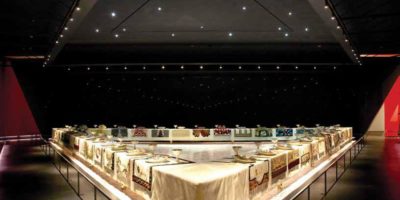What We Wish They’d Said
The Lost: A Search for Six of Six Million (Harper Collins, $27.95) is an attempt by Daniel Mendelsohn to recover the history of his great-uncle Shmiel’s family of six, killed in the Holocaust in Ukraine. Mendelsohn’s account of his research takes the reader from New York to Australia to Sweden to Israel. Along the way, he grapples with the ephemerality and arbitrariness of remembrance — what is remembered, and when, and by whom.
The Lost initially focuses on Shmiel: on his occupation as a shipper and meat trucker, his correspondence with family members, and his insistent expressions of despair about the political situation of his day. In Shmiel’s letters to his brother, Mendelsohn’s grandfather, the reader can hear his supplications: “For my part, I am going to post a letter, written in English, to Washington, addressed to President Roosevelt and will write that all my siblings and my entire family are in America and that my parents are even buried there… perhaps that will work.”
Unlike Shmiel, who is remembered through his work and his words, the women of this book are remembered through their actions, their homes and their loves — or not remembered at all. Ester, Shmiel’s wife, remains lost. Witnesses interviewed by Mendelsohn attest that, thanks to Ester, the family’s house “was always very clean.” “She was warm, very friendly, cheerful.” “Like all the other Jewish mothers!” But there is no one to remember any more, and perhaps there is not much more to remember. After all, she was a mother and a wife — what is there beyond these roles? Similarly, the youngest daughter, Bronia, who was only 13 when she died, remains a generic figure. “Bronia was simply too young, and it is simply as an ordinary young girl that the few people who could remember anything about her in 2003 recalled her, and hence it is as an ordinary girl I must now describe her, too,” Mendelsohn states. And yet, would we ever say the same of Anne Frank?
Mendelsohn examines correspondence, geneaologies and archives. But it is his “live-action” research, as it were, which shapes the tone of the book. When he asks one survivor, “So, I should really come to Australia?” the reply is, “Don’t hesitate… because I won’t last long.”
Throughout The Lost, Mendelsohn frequently references biblical characters: he invokes Cain and Abel to examine the love/hate between siblings, and Abram’s evolution into Abraham to explicate the inherent merits of a life-changing quest. The author himself is reminiscent of Jacob wrestling with the angel as he valiantly struggles with something just beyond his comprehension. The Lost provides a vicarious thrill every time Mendelsohn stumbles onto a clue of his family’s history. Through his book, the reader feels as though she is unearthing a treasure long-buried: jewels of individuality, previously lost in a sea of nameless corpses. The Lost is not just a historical account, but a challenge to all of us to consider what about us will transcend the boundaries of our lifetimes.
Jordana Horn is a lawyer and writer working on her first novel.


